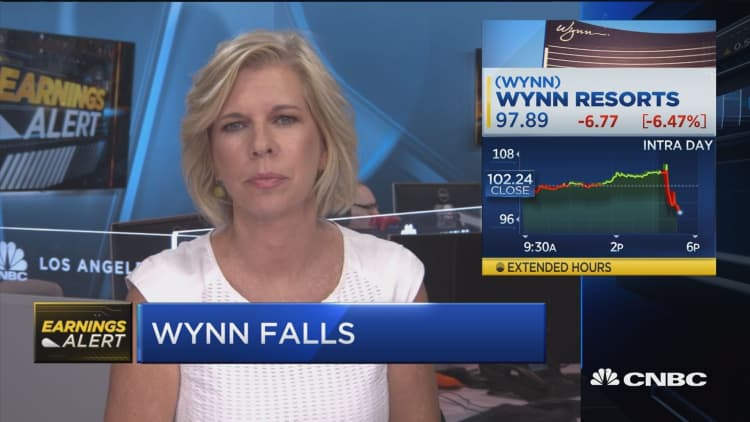Investors wagering on Wynn Resorts' newest Macau property are finding that even as the government supports development in the gambling region, it insists on a policy that could limit gaming-related growth.
Macau, the only place where it is legal to gamble in China, has a policy in place that curbs the supply of new game tables to 3 percent compound annual expansion.
Designed as a way of prodding casino companies to offer more non-gaming activities, those table caps limit the amount of dealer activity at their properties, as well as the inflow of game money from Chinese gamblers. As a result, they have the potential to reduce earnings for casino-resort operators in the market.
"It's a pretty significant driver of revenue to have as many as tables as you can, especially during peak periods," Union Gaming analyst John DeCree said.
Wynn Resorts is set to open its $4.2 billion Wynn Palace property in Macau's Cotai area on August 22. In advance of that opening, industry analysts had predicted the casino-resort would get a table allocation from regulators of between 200 and 250. Those estimates were not considered overly optimistic, since they were roughly equivalent to the allocation at two other Cotai casino properties.
But in its second-quarter earnings report late Thursday, the company disclosed that "we will receive an allocation of approximately 100 table games for Wynn Palace, with additional table games allocated to us post-opening." Investors sold off the company's stock on the news, as the lower-than-expected initial allocation could dampen the earnings potential for Wynn Palace next year.
"A 150-table deficit reduces the earnings power of Wynn Macau by $85 million in 2017 and lowers fair value from $92 to $83," Nomura analyst Harry Curtis said in a research note Friday. The firm likewise lowered its stock rating on Wynn Resorts to "reduce" from "neutral," indicating the initial "paltry allocation is a clear message from Beijing that it is serious about Macau enforcing the table cap."
Wynn shares fell more than 6 percent, to $97.95, on Friday, with nearly 8 million shares exchanging hands. That compares with the stock's 10-day average volume of roughly 2.5 million shares. Yet even with Friday's decline, the stock is up more than 40 percent this year; and some analysts saw Friday's dip as a buying opportunity.
"We think the market is a little skittish heading into the [Wynn Palace] opening," DeCree said. He raised his price target on Wynn stock to $115 Friday, from his previous target of $105.

To offset the lower 100 new table game allocation, Wynn Resorts said it is prepared to shift about 250 tables games from its Wynn Macau property to Wynn Palace. However, such a move raised some concerns about potential self-cannibalization of the company's Macau business.
"While we do not dispute management's observations that many of the tables to be shifted are underperforming, we cannot overlook the fact that Wynn Macau's footprint will be cut in half," CLSA analyst Jon Oh wrote in a research note. "We don't think Wynn Palace's economics change in this scenario, but remain concerned that the market is underestimating the risk of self-cannibalization."
Some analysts expect the company to eventually get a more generous table allocation from the Macau government; but the exact timing of that is unclear. When asked about it during the company's call with analysts Thursday, CEO Steve Wynn said, "They don't tell us in advance about such things, and so the best thing for us to do is not to plan for it."
Also, there's also no guarantee regulators will grant the additional tables, particularly if they think there's sufficient table gaming capacity in the market. The table allocation concerns could also weigh negatively on other casino-resort operators as they look to expand gaming activities in the Macau market.
"With two new Cotai resorts opening in [the third quarter] and one opening in [the first quarter of 2017], we think the Macau government is likely to strictly enforce the table growth goal, even though an obvious solution to Macau's [gross gaming revenue] slump would be to roll out more tables and attract more traffic," Nomura's Curtis said.
For the June quarter, Wynn Resorts reported adjusted earnings per share of $1.07 per share. That compares with 74 cents per share a year ago and beat the average analyst estimate of 91 cents per share, according to Thomson Reuters.
Revenue in the quarter was $1.06 billion, up about 2 percent from $1.04 billion a year ago. The company said the improved revenue was due to a 3.6 percent rise from its Macau operations, which was dampened by a 1.1 percent decline from its Las Vegas business.
The Macau operations generated revenue of $639.3 million in the quarter, well ahead of the consensus estimate of $590.2 million. Adjusted earnings also beat for the company's Macau business.


